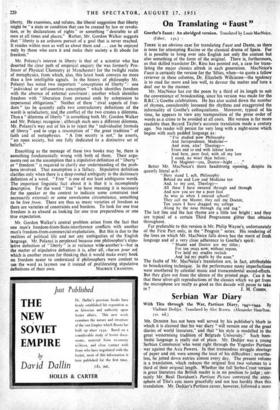On Translating 66 Faust "
THERE is an obvious case for translating Faust and Dante, as there is none for attempting Racine or the classical drama of Spain. For it is possible to bring over into English not only the content but also something of the form of the original. There is, furthermore, as that skilled translator Dr. Rieu has pointed out, a case for trans- lating the major classics afresh in each generation. MacNeice's Faust is certainly the version for the 'fifties, when—to quote a fellow reviewer in these columns, Dr. Elizabeth Wilkinson—the tendency is to read far more and less well, to devour the matter and.turn a deaf ear to the manner.
Mr. MacNeice has cut the poem by a third of its length to suit the convenience of broadcasting, since his version was made for the B.B.C.'s-Goethe celebrations. He has also scaled down the number of rhymes, considerably loosened the rhythms and exaggerated the informality of Goethe's colloquialisms. Moreover, typical of his time, he appears to view any transposition of the prose order of words as a crime to be avoided at all costs. His version is far more readable than Bayard Taylor's accurate translation made a century ago. No reader will persist for very long with a night-scene which begins with such padded language as:
"I've studied now Philosophy
And Jurisprudence, Medicine— And even, alas! Theology—
From end to end with labour keen And here, poor fool, with all my lore I stand, no wiser than before: I'm Magister—yea, Doctor—hight . . ."
Better Mr. MacNeice's more headstrong opening, despite its queerly literal ach: " Here stand I, ach, Philosophy Behind me and Law and Medicine too
And, to my cost, Theology—
All these have sweated through and through And now you see me a poor fool As wise as when I entered school!
They call me Master, they call .me Doctor, Ten years I have dragged my college Along by the nose through zig and zag." The last line and the last rhyme are a little too bright ; and they are typical of a certain Third Programme glitter that obtains throughout.
Far preferable to this version is Mr. Philip Wayne's, unfortunately of the First Part only, in the " Pen,g'uin " series. His rendering of the lines on which Mr. MacNeice falls down has the merit of fresh language and of a very close adherence to Goethe's spirit:
" Master and Doctor are my titles - For ten years now, without repose, I've held my erudite recitals.
And led my pupils by the nose."
The faults of Mr. MacNeice's translation are, in fact, attributable to broadcasting technique. In the performance many imperfections were smothered by celestial music and transcendental sound-effects. But they glare out from the silence of the printed page. Can it be that these silver-gilt reproductions of the classics which we get from the microphone are really as good as this decade will pause to take






























 Previous page
Previous page